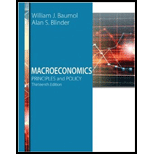
To describe:To impact on the money supply if the
Answer to Problem 1TY
In order to attain a 10% reserve ratio, a deposit of 12$ million will lead to the increase in the money supply by a factor of 10 times.
Explanation of Solution
Money multiplier can be defined as a cash multiplier is one of different firmly related proportions of commercial bank cash to central bank cash under a partial hold banking framework.
Change in the money supply
In the economy it can be assumed that the banks had no
So, in order to calculate the money supply, the following equation can be employed:
MS = D×1/m ……………….. (1)
Here,
MS=money supply
D= deposit change value
M= required reserve ratio
So, according to the given condition the change in the money supply can be calculated as;
MS=12000000×1/0.10
=120,000,000
Thus the deposit of 12$ million will lead to an increase in the money supply by a factor of 10, that will be 120 $ million.
Introduction: In monetary economics, a cash multiplier is one of different firmly related proportions of commercial bank cash to central bank cash under a partial hold banking framework. It identifies with the most extreme measure of commercial bank cash that can be made, given a specific measure of central bank cash.
Want to see more full solutions like this?
Chapter 12 Solutions
Macroeconomics: Principles and Policy (MindTap Course List)
- Jane deposits $175 into her bank, and the reserve requirement is 15 percent. How much is the excess reserve in dollarsarrow_forwardIf banks have a required reserve ratio of 25%, and one bank is currently holding $10,000 in excess reserves, what would be the maximum possible change to the money supply if the bank loans out all of the excess reserves?arrow_forwardSuppose Adrienne receives a payment in cash of $400 and she deposits it in a bank. i. If the banking system is 100 percent reserve, how does the money supply change? i. If the reserve requirement is 10 percent and the bank holds no excess reserve, how does the money supply change? in. If the reserve requirement is 10 percent and the bank holds an excess reserve of 2 percent, how does the money supply change? iv. Now suppose the reserve ratio is 25 percent. How much money can be created from $100 of reserves? Show your work.arrow_forward
- Suppose you found Rs. 2000 that was stored under your grandmother's mattress and you decided to deposit this money in a Bank of India. If the desired reserve ratio were 20 percent and all excess reserves were lent out. a) Calculate the money supply created by this deposition in the economy?b) Following a new deposit of Rs. 2000, what is the reserve requirement of the commercial bank?c) Suppose all the banks in the banking system collectively have Rs.20 million in cash reserves and have a desired reserve ratio of 20 percent, the maximum amount of demand deposits the banking system can support is?arrow_forwardYou just deposited $4,000 in cash into a checking account at the local bank. Assume that banks lend out all excess reserves and there are no leaks in the banking system. That is, all money lent by banks gets deposited in the banking system. Round your answers to the nearest dollar. If the reserve requirement is 20%, how much will your deposit increase the total value of checkable bank deposits? If the reserve requirement is 8%, how much will your deposit increase the total value of checkable deposits? Increasing the reserve requirement decreases the money supply. %24 %24arrow_forwardSuppose you win on a scratch-off lottery ticket and you decide to put all of your $3,500 winnings in the bank. The reserve requirement is 5%. What is the maximum possible increase in the money supply as a result of your bank deposit? maximum increase: $ Which events could cause the increase in the money supply to be less than its potential? Banks choose to loan out all excess reserves. Some loan recipients choose to hold some cash instead of depositing all of it in banks. Banks decide to keep some excess reserves on hand. All money loaned out is deposited back into the banking system.arrow_forward
- Suppose that your bank's reserve ratio is 0.2 and you deposit $50,000 into the bank. Assume that the bank loans out the maximum amount it can, and people deposit all their money. What is the deposit multiplier? What is the total increase in deposits in the banking system? What is the change in the money supply?arrow_forwardBanks have a reserve ratio of 20%, and households deposit all cash into the banking system. How many dollars should the Fed print in order to increase the money supply by $7,000,000?arrow_forwardA reserve requirement of 10 percent means a bank must have at least $300 of reserves if its Checkable deposits arearrow_forward
- The Fed conducts a $10 million open-market purchase of government bonds. If the required reserve ratio is 10 percent, what are the largest and smallest possible increases in the money supply that could result? Explain.arrow_forwardSuppose banks increase excess reserves by $574,207. If the reserve ratio is 6%, what is the maximum increase in the money supply?arrow_forwardIf the reserve ratio is 5% and a bank receives a new deposit of $500, what will the bank do?arrow_forward
 Economics (MindTap Course List)EconomicsISBN:9781337617383Author:Roger A. ArnoldPublisher:Cengage Learning
Economics (MindTap Course List)EconomicsISBN:9781337617383Author:Roger A. ArnoldPublisher:Cengage Learning
 Exploring EconomicsEconomicsISBN:9781544336329Author:Robert L. SextonPublisher:SAGE Publications, Inc
Exploring EconomicsEconomicsISBN:9781544336329Author:Robert L. SextonPublisher:SAGE Publications, Inc


